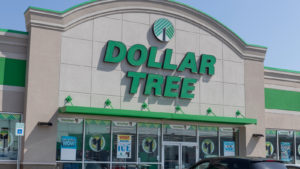The retail sector has suffered outsized losses relative to the broader market in 2022 as consumers have reined in spending amid an economic downturn and possible recession. Year to date, SPDR S&P Retail ETF (NYSEARCA:XRT) is down 36% compared to a 21% decline in the S&P 500. The silver lining here is that investors have the opportunity to purchase undervalued retail stocks while their shares are on sale.
To be sure, the signs remain mixed for the sector. Consumer sentiment is poor, even after rebounding slightly. Yet, holiday retail sales are expected to increase by 4% to 6% this year, according to Deloitte.
For investors who are ready to wade back into the sector, consider doing so with these undervalued retail stocks.
| WMT | Walmart | $136.80 |
| TJX | TJX Companies | $67.61 |
| CHWY | Chewy | $37.38 |
| DG | Dollar General | $239.37 |
| DLTR | Dollar Tree | $143.61 |
| AMZN | Amazon | $119.32 |
| ULTA | Ulta Beauty | $382.81 |
Undervalued Retail Stocks: Walmart (WMT)

Walmart (NYSE:WMT) is the largest retailer in the world by revenue, generating $208 billion more than No. 2 Amazon (NASDAQ:AMZN), according to a March report by the National Retail Federation.
Walmart’s scale simply cannot be discounted. In general, the larger the company, the greater its cost savings. Walmart customers inherently recognize this advantage when comparing Walmart’s prices with those of other retailers.
WMT stock has held up much better than the broader market this year, down just 5.5%. But it fell sharply following the release of the company’s fiscal first-quarter results in mid-May. Shares lost more than a third of their value in a single day after a rare earnings miss. Luckily, fiscal Q2 results were much better, with the company beating estimates on the top and bottom lines and reiterating its full-year forecast.
Walmart is resilient and should continue to draw in shoppers across all income groups as a recession looms.
TJX Companies (TJX)

TJX Companies (NYSE:TJX) appears to be navigating the economic downturn well. Shares of the parent company of T.J. Maxx, Marshalls and HomeGoods have outperformed the retail sector, down just 11% year to date.
While second-quarter sales slipped 1.4% from a year ago, revenue for the first half of the year was up nearly 5%. Moreover, despite the Q2 sales decline, net income increased by 3%. Therefore, the company seems well-equipped to handle the current retail environment.
What’s more, the company creates value for shareholders as measured by its weighted average cost of capital of 8.1% versus return on invested capital of 19.2%.
The company’s strategy of offering branded goods to customers at discounted prices should continue to work well as consumers look to stretch their more limited discretionary dollars, especially during the upcoming holiday season.
Undervalued Retail Stocks: Chewy (CHWY)

Online pet retailer Chewy (NYSE:CHWY) was a pandemic star that has come back down to Earth. That’s not a bad thing, though, at least not for investors looking for undervalued retail stocks to buy.
For the second quarter, Chewy reported net sales of $2.43 billion, up 12.8% year over year. That was slightly below the $2.45 billion Wall Street expected. However, Chewy reported a surprise profit of 5 cents per share. Analysts had been calling for a 12-cent per-share loss for the quarter.
CHWY stock dropped anyway, falling 8% in a single day. The problem was the company’s guidance. Management’s forecasts for Q3 and the full year were below what analysts had been expecting.
While economic uncertainty is causing pet owners to curtail spending, the overall trend in pet spending is clearly to the upside. Morgan Stanley forecasts pet spending will triple between 2021 and 2030.
CHWY stock is down 37% so far this year. This buy-the-dip opportunity is too good to ignore.
Dollar General (DG)

Dollar General (NYSE:DG) was made for this kind of economy. In fact, its CEO recently said that its stores are attracting wealthier shoppers looking to save money. Dollar General’s sales rose 9% year over year in the second quarter and were up 6.6% in the first half of 2022.
The company is expanding rapidly, increasing its square footage by 5.6% in the first half of the year and opening 466 new stores. And it plans to repurchase $2.75 billion worth of shares. That means current shareholders will see the value of their shares increase.
Analysts are calling for revenue growth of 10.7% this year to $37.9 billion. Earnings are expected to grow 13.8% to $11.57 per share.
DG stock is up 1.5% for the year, which is an indication of its ability to thrive in a tough economic environment. However, shares look cheap based on analysts’ estimates. With an average price target of $268.55, analysts are predicting shares could rise 12% from current levels. The most optimistic price target of $296 implies upside of nearly 24%. In other words, there’s still time to buy DG stock.
Undervalued Retail Stocks: Dollar Tree (DLTR)

Dollar Tree (NYSE:DLTR) is a competitor to Dollar General, but in this economy, there is plenty of room for both deep-discount retailers.
Dollar Tree, which also operates Family Dollar stores, is the smaller of the two, generating about 25% less revenue than Dollar General over the past 12 months. In the first half of 2022, Dollar Tree’s revenue and net income both increased by 6.6% year over year.
DLTR stock is up 2.2% year to date. However, based on analysts’ average price target of $168.26, it has further to run than DG stock. The mean target implies upside of 17%, while the high target of $195 suggests shares could deliver a 36% return.
Both DLTR and DG are worthy investments for those looking for undervalued retail stocks to buy as consumers tighten their purse strings.
Amazon (AMZN)

Conventional thinking states that when the economy is in trouble, the world’s second-largest retailer — Amazon (NASDAQ:AMZN) — will suffer. Indeed, AMZN stock is trading near a two-year low, and its price-to-book ratio is near a 10-year low.
Yet, discerning investors should ask themselves whether Amazon is really in trouble or whether its issues are the result of it being the leader in e-commerce cyclical retail. My guess is that it’s the latter.
Despite its massive footprint, Amazon’s three-year revenue growth rate is better than 87% of retailers. And analysts predict the company will generate double-digit revenue growth this year and next.
When the economy begins to expand once again, AMZN stock is likely to rocket higher. Based on analysts’ average price target of $163.95, shares could rally by as much as 37%.
Undervalued Retail Stocks: Ulta Beauty (ULTA)

Beauty products retailer Ulta Beauty (NASDAQ:ULTA), fittingly enough, is benefitting from a phenomenon known as the lipstick effect. The lipstick effect refers to the idea that consumers spend more on small indulgences, like cosmetics, during recessionary periods as higher-priced luxuries become less attainable.
During the first half of the year, Ulta Beauty’s revenue increased 19% year over year to $4.6 billion, and the company opened 17 new stores. Ulta Beauty is a highly profitable company with metrics including return on assets, return on equity, and return on invested capital that are all in the 95th percentile or better for the retail industry.
ULTA stock is down 7% year to date. Analysts’ average price target of $487.08 implies upside of 27% for shares of the largest beauty retailer in the United States.
On the date of publication, Alex Sirois did not have (either directly or indirectly) any positions in the securities mentioned in this article. The opinions expressed in this article are those of the writer, subject to the InvestorPlace.com Publishing Guidelines.
